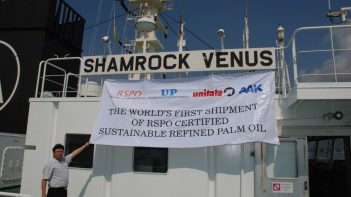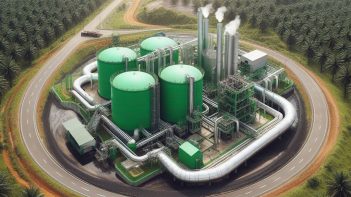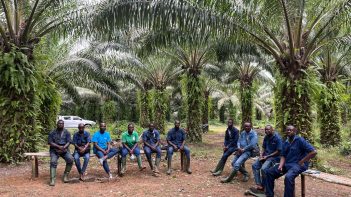Jakarta, 24 March 2015 – More than 200 farmers in Dosan village, district Siak, Riau, who were incorporated in Cooperative (KUD) Bungo Tanjung, have now joined the Roundtable on Sustainable Palm Oil (RSPO). With a total plantation area of 723 hectares, KUD Bungo Tanjung’s membership of RSPO represents yet another important step towards the implementation of sustainable practices in palm oil plantations in Indonesia.
Firdaus, Head of Dosan Village and Supervisory Board of KUD Bungo Tanjung said, “We want to be sustainable farmers who implement best agricultural practices to preserve our environment. In addition to that, we are hoping that through RSPO, we can help our member, the independent palm oil smallholders, to implement sustainability practices and to help them to improve the production and economic performance.”
KUD Bungo Tanjung journey in palm oil started when the Government of Siak initiated a program in 2003 to improve the community’s economy. “Originally, the palm oil plantation program was launched by the local government to improve the economy. A year after the program was launched, the community started the planting. In 2008 the plantation has shown result from its production and the community started to show some initiative towards sustainable palm oil plantation management,” explained Firdaus.
The initiative then strengthened its efforts in 2009 when they were first introduced the Principles and Criteria of the RSPO. Two years after, Dosan village commenced a commitment to implement sustainable practices in the management of palm oil plantations and pledged not to over expand the planted land, as a move to protect the local forest area. They have, then, acquired recognition by the former Minister of Agriculture, Mr. DR. Ir. H. Suswono, MMA., during his visit in January 2013 to Dosan village.
In the path of implementing best agriculture and sustainable palm oil practices, Dosan village was assisted by non-governmental organizations, Perkumpulan Elang and Greenpeace, specifically to develop their palm oil plantings while avoiding expansion into peatlands and forests.
KUD Bungo Tanjung’s membership in the RSPO received positive reaction from both organizations. Greenpeace Indonesia’s Forest Campaigner, Annisa Rahmawati said, “Greenpeace applauds the leadership and achievement of the people of Dosan village, who will not only gain global market recognition through its membership, but will inspire replication of their forest protection commitment in other villages and companies nationwide.”
Santo Kurniawan, Chairman of Perkumpulan Elang added, “What we really appreciate most is the process that has made the Cooperative to develop into where they are now. They began in a condition where they had limited knowledge and access, and then it gradually progressed. And now, they have successfully become member of the RSPO.”
As a global, multi-stakeholder initiative on sustainable palm oil, RSPO vision is to transform the markets by making sustainable palm oil the norm. Smallholders play a very important role to help achieving this, with their 40% contribution towards global palm oil production.
Desi Kusumadewi, RSPO Indonesia Director proudly welcomed the newly-joined member, “I am very proud and pleased to have KUD Bungo Tanjung as part of RSPO. With their experience and commitment on sustainable palm oil production, not only they have contributed to improve the social economy of their families and communities in general, they have also contributed to protect the environment by preserving its forest. Their commitment and accomplishment is something that we can be proud of and this shows that moving towards sustainable palm oil production is possible for independent smallholders.”
Annisa added by highlighting the needs of industry and government to put more support to the smallholders. “Smallholders produce around 40 percent of Indonesia’s palm oil. It is time for industry and government to ensure support for smallholders to contribute to the deforestation-free palm oil supply chain now demanded by international markets.”
About RSPO
In response to the urgent and pressing global call for sustainably-produced palm oil, the Roundtable on Sustainable Palm Oil (RSPO) was formed in 2004 with the objective of promoting the growth and use of sustainable oil palm products through credible global standards and engagement of stakeholders. The seat of the association is in Zurich, Switzerland, while the secretariat is currently based in Kuala Lumpur with satellite offices in Jakarta, London and Zoetermeer (NL).
RSPO is a not-for-profit association that unites stakeholders from seven sectors of the palm oil industry – oil palm producers, palm oil processors or traders, consumer goods manufacturers, retailers, banks and investors, environmental or nature conservation NGOs and social or developmental NGOs – to develop and implement global standards for sustainable palm oil.
Such multi-stakeholder representation is mirrored in the governance structure of RSPO such that seats in the Executive Board and project-level Working Groups are fairly allocated to each sector. In this way, RSPO lives out the philosophy of the "roundtable" by giving equal rights to each stakeholder group to bring group-specific agendas to the roundtable, facilitating traditionally adversarial stakeholders and business competitors to work together towards a common objective and make decisions by consensus.
Contacts for RSPO Secretariat:
Stefano Savi
Acting Communications Director
T: +603 2302 1500
Dhiny Nedyasari
Communications Manager – Indonesia
T: +62 21 2506417
Keep reading

Nearly two decades on, Europe continues to drive global demand for RSPO Certified Palm Oil

Communicating Sustainable Palm Oil - examples of success across Europe
[EOT] Terms of Reference: Independent Smallholders Outreach Programme in Indonesia

RT2023 Delegates Propose Solutions to Reinforce RSPO’s Assurance System – End-Year Highlights of Assurance Standing Committee
RSPO UK Members' Day Examines Shifting Dynamics of Doing Business within Europe

Celebrating 20 Years of RSPO’s Sustainability Journey

Circular Economy and Biomass: A Game-Changer for the Sustainable Palm Oil Industry
Uptake Targets for Shared Responsibility for 2024 (Year 5) and Shared Responsibility Verification Manual




